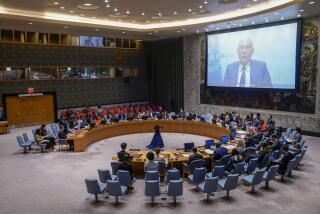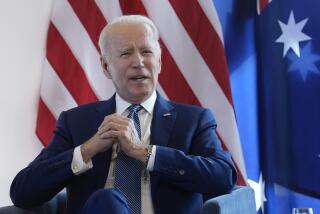North Korea Nuclear Talks Adjourn for Three Weeks
- Share via
BEIJING — After a marathon 13 days of negotiations, international talks aimed at ending North Korea’s nuclear weapons program ended in stalemate today with the participants agreeing to recess and return to the meetings at the end of the month.
The decision was announced by Chinese officials after they and representatives of the two Koreas, United States, Japan and Russia failed to come up with a joint statement setting the principles to guide future talks. The official New China News Agency said in a short dispatch that the talks would resume Aug. 29.
The main stumbling block appeared to be North Korea’s insistence on retaining a “peaceful” nuclear program for generating electricity -- an idea Washington considers unacceptable because it fears North Korea could use it to revive a weapons program.
Assistant Secretary of State Christopher Hill, the U.S. envoy to the talks, said this morning: “I think we’ve made some progress here. I don’t think it’s unrealistic to talk about a good round as early as September.”
Hill said the 13 days of talks were useful as the envoys hashed over four successive drafts of the planned joint statement. “We now know what’s agreed and what’s in brackets” -- or still up for discussion, he said.
Although there was “a lot of consensus” on the fourth draft, Hill said, North Korea wanted to put into that document language that would allow it to retain a light-water nuclear reactor. “No one else wants this,” Hill said.
North Korean envoy Kim Gye Gwan said in a briefing today that the U.S. had to meet his country halfway.
“We had to produce nuclear weapons because the U.S. has been threatening us with nuclear weapons,” he said at his country’s embassy in Beijing.
Analysts said the recess did not necessarily mean the talks were useless.
“I don’t think this is a failure or the end of the six-party talks,” said Paik Hak Soon, a North Korea expert at South Korea’s Sejong Institute. “The recess means both sides will have more time to think about a compromise. There is ample opportunity to come back to the negotiation tables to resolve the nuclear issue.”
Observers pointed to several significant developments in this round of talks, among them the unprecedented duration of the meetings. Three previous rounds lasted about three days each and ended with no agreements. This time, the six parties met for almost two weeks.
Another key change was that delegates from the U.S. and North Korea held a number of one-on-one sessions, something the communist nation had demanded in the past but that Washington had resisted.
But there were also significant disagreements. The U.S. and North Korea butted heads even over the meaning of denuclearization.
The United States has insisted that North Korea give up all nuclear weapons programs, including a uranium enrichment program, something the North has denied having.
Pyongyang, meanwhile, insisted that the United States dismantle the “nuclear umbrella” that helps protect its ally South Korea. Washington says it has long removed its nuclear weapons from South Korea and has no intention of invading the North, but those statements apparently have not satisfied Pyongyang.
More so than in previous talks, Pyongyang and Washington discussed linking denuclearization with normalization of relations. At the start of the talks last month, the communist state had set full diplomatic recognition as a key objective in return for relinquishing its nuclear weapons. The U.S. says the North would have to give up the nuclear weapons first.
“The situation probably has to get worse before it gets better,” said L. Gordon Flake of the Mansfield Foundation in Washington. “The real issue is North Korea is not prepared to abandon their nuclear weapons. Why? Clearly inducements alone is not going to do it. They have to be convinced there is no other option.”
If the next round of talks later this month does not produce results, Washington could take much more coercive measures, including going to the United Nations Security Council to seek sanctions.
That would be an embarrassment for Beijing, which was host to all the talks and has a lot banking on their success.
“The recess is really a Chinese push, an effort to head off U.S. pressures, to see if the U.S. is willing to give the Chinese a couple of weeks to work on the North Koreans,” Flake said.
More to Read
Sign up for Essential California
The most important California stories and recommendations in your inbox every morning.
You may occasionally receive promotional content from the Los Angeles Times.













